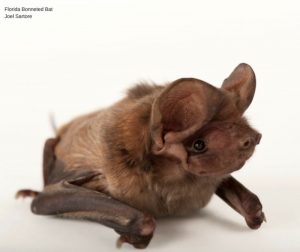1.5 Million Acres for Florida Bonneted Bat
 The U.S. Fish and Wildlife Service has proposed designation of 1.5 million acres as critical habitat for the Florida bonneted bat in response to a legal agreement with the Center for Biological Diversity, Tropical Audubon Society and the Miami Blue Chapter of the North American Butterfly Association. The bat is found only in South Florida where its population declined steeply as its forest and wetland habitats were developed and/or denigrated by pesticides for decades. As a result, it was listed as an endangered species in 2013, yet the Service failed to designate lifesaving critical habitat as required.
The U.S. Fish and Wildlife Service has proposed designation of 1.5 million acres as critical habitat for the Florida bonneted bat in response to a legal agreement with the Center for Biological Diversity, Tropical Audubon Society and the Miami Blue Chapter of the North American Butterfly Association. The bat is found only in South Florida where its population declined steeply as its forest and wetland habitats were developed and/or denigrated by pesticides for decades. As a result, it was listed as an endangered species in 2013, yet the Service failed to designate lifesaving critical habitat as required.
The 1.5 million acres of Florida bonneted bat critical habitat finally proposed on June 9 are located in areas of Charlotte, Collier, DeSoto, Glades, Hardee, Hendry, Lee, Miami-Dade, Monroe and Sarasota counties; each area possesses the physical and biological features necessary for the species survival and recovery.
“Designation of this critical habitat is an indispensable step toward protection of this unique South Florida species,” says Paola Ferreira, executive director of Tropical Audubon Society. “The Florida bonneted bat’s survival required urgent conservation action given the continued threats it faces from habitat destruction and sea level rise.” Ferreira also notes that “Protecting habitat for the Florida bonneted bat will also contribute to the conservation of important bird species and other species in peril.”
Named for the broad ears that hang over its forehead, the bonneted bat is the largest of Florida’s 13 bat species and the second largest in North America. It roosts in old tree cavities and artificial structures, and forages for insects over open spaces such as wetlands and open fresh water. It also uses one of the lowest-frequency echolocation calls of all bats, so some people are actually able to hear the bonneted bat’s bird-like chirps as it hunts insects. Read Tropical Audubon Society’s press release.
The U.S. Fish and Wildlife Service is accepting comments on its proposal up until August 10, 2020. Read the U.S. Fish and Wildlife Service’s Advisory to learn more and/or to comment on the proposal.
Read WLRN coverage about the Florida bonneted bat and the proposed designation.
